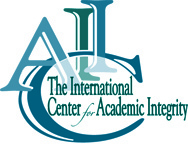Empowering Practices: 3 Steps You Can Take Now To Improve Academic Integrity
Published by: WCET | 2/17/2015
Tags: Academic Integrity
Published by: WCET | 2/17/2015
Tags: Academic Integrity
Today we welcome academic integrity expert Tricia Bertam Gallant, Outreach Coordinator at the International Center on Integrity, who will share with us how they are helping institutions employ academic integrity best practices. The “Trusted Seal of Integrity” should help us combat issues like those addressed in this December 30 article. Tricia and her team are making great strides, but they can’t combat integrity issues in a bubble, they need the support of the entire academic community to do so! Thank you Tricia for the informative blog and the great work you’re doing.
There is a rumor I frequently hear uttered (both under one’s breath and outright, as if in exclamation) — “online students cheat more than regular students!”
This rumor is uttered in traditional brick and mortar institutions by faculty who are resisting online education. It is uttered in general society by people who want, yet fear, new and expanding opportunities for people to undertake higher education. And the rumor is uttered by online instructors who worry that academic integrity will be undermined by people they cannot identify or know.
The truth is that there is no research to support the claim that online students cheat more than students who take traditional brick-and-mortar classes. The research, in fact, is inconclusive. Some online students cheat more than some traditional students, and some traditional classes have more cheating than some online classes.
Why is the Research on Online Cheating Inconclusive?
 The research is inconclusive because the research doesn’t consider the practices employed by the instructors of those courses. And the truth is that online and traditional brick-and-mortar class instructors can implement the same best practices to enhance integrity and reduce cheating. There is no secret here to what works – we just need to commit to applying them in the online educational environment.
The research is inconclusive because the research doesn’t consider the practices employed by the instructors of those courses. And the truth is that online and traditional brick-and-mortar class instructors can implement the same best practices to enhance integrity and reduce cheating. There is no secret here to what works – we just need to commit to applying them in the online educational environment.
The best practices to enhancing integrity and reducing cheating in any classroom are to:
Inform and Educate
Generally speaking, many university bound students are ignorant of academic integrity. Yes, they may have been taught not to lie, cheat or steal, like most of us, but they have existed (and thrived) in educational environments in which almost any method for getting assignments in and passing tests is acceptable, or at least, only lightly punished.
This means that our domestic or international, online or face-to-face, younger or older students, all need to be informed and educated on academic integrity and specifically about the academic integrity “dos and don’ts” of a particular classroom, program and/or institution. And, their knowledge needs to be assessed so we can be more certain that they do share the same understanding that we do.
Prevent and Protect
We also need to take steps to ensure that our assessment practices promote integrity. Are we verifying student identity when they are demonstrating their knowledge? Are we monitoring and verifying the integrity of assessments? This is critical, of course, in both in-person and online exams.
If the online students are taking their exams in person, the institution should ensure that the testing site is employing best integrity practices, and if the online student is taking his or her exam remotely, the institution should be using technological tools to ensure that the person completing the assessment is the person who is enrolled in the class.
Practice and Support
Finally, in order to support both faculty and students in ensuring that integrity is the norm and cheating is the exception, the program and institution needs policies and procedures that are consistently implemented, equitable, and reviewed. These policies should encourage consistent reporting of integrity violations, provide for a fair and educational process for alleged violators, provide a teachable moment, and be reviewed every 3-5 years to ensure the integrity of the process.
The “Trusted Seal of Integrity”
 If we manage to do these three things in online (or face-to-face) educational environments, then we will be employing best integrity practices, and, perhaps more importantly, it will be more likely than not that cheating will be the exception and integrity the norm.
If we manage to do these three things in online (or face-to-face) educational environments, then we will be employing best integrity practices, and, perhaps more importantly, it will be more likely than not that cheating will be the exception and integrity the norm.
To help faculty, programs and institutions employ these best integrity practices, the International Center for Academic Integrity and Software Secure have partnered to develop the Trusted Seal of Integrity program. This program provides faculty, programs and institutions with a rubric by which they can assess how well they are employing best integrity practices. And, if they are performing sufficiently, they can be awarded the Trusted Seal – a public declaration that integrity is a priority for the instructor, the program and the institution.
For more information about Trusted Seal, you can email me or visit us at www.integritytrusted.com. I’d be happy to hear from you!
ICAI & Trusted Seal